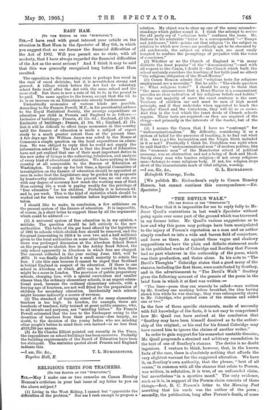RELIGIOUS TESTS FOR TEACHERS. [To TUE EDITOR OF THE "
SPECTATOR."]
SIR,—May I make one or two remarks on Canon Hensley Henson's criticism in your last issue of my letter to you on the above subject ?
(1) Living in the West Riding, I cannot but "appreciate the difficulties of the problem." Nor am I rash enough to propose a
solution. My object was to clear up one of the many misunder- standings which gather round it. I think the attempt to revive the old party cry of "religious tests" confuses the issue. Mr. Balfour in his admirable " letter to a correspondent "—" Essays and Addresses," 1905—points out that religion "is the subject in relation to which new issues are peculiarly apt to be obscured by old catchwords, the subject on which men are most easily tempted to confuse the prompting of prejudice with the voice of conscience."
(2) Whether or no the Church of England is "in many districts the least popular" of the "denominations "—and with all respect to the Canon, I doubt it—the Church which built the school certainly considers the teaching of her faith (and no other) "the religious obligation of the Head-Master."
(3) Canon Henson admits that "religious tests for religious employment are a necessity." But he adds : " The whole question is: What religious tests?" I should bo sorry to think that "the mere circumstance that a Head-Master is a communicant provides no clear indication of his religious beliefs and habits." In the vast majority of cases the exact contrary is the case. Teachers of children are and must bo men of high moral principle, and if they undertake when appointed to teach the Apostles' Creed and the Catechism, they will do so cz animo. And this is the test which the trust deeds of Church schools require. These tests are required—as they are required of the clergy—not primarily in the interests of the teacher, but of the taught.
(4) I assure the Canon that I have no " contempt " for " undenoininationalism." My difficulty, considering it as a system of belief for the purposes of teaching, is to find out what it is. Are (e.g.) the Incarnation and the Virgin Birth included in it or not ? Practically I think Dr. Creighton was right when he said that the " undenominational man " of modern politics, like the " economic man " of the Manchester school of political economy, was an abstraction and not a being of flesh and blood. Surely every man who teaches religion—if not every religious man—belongs to some religious body. If not, his religion stops short of the characteristic mark of vital religion, worship.
[We publish Mr. Riebardson's reply to Canon Hensley Henson, but cannot continue this correspondence.—En. Spectator.]






































 Previous page
Previous page